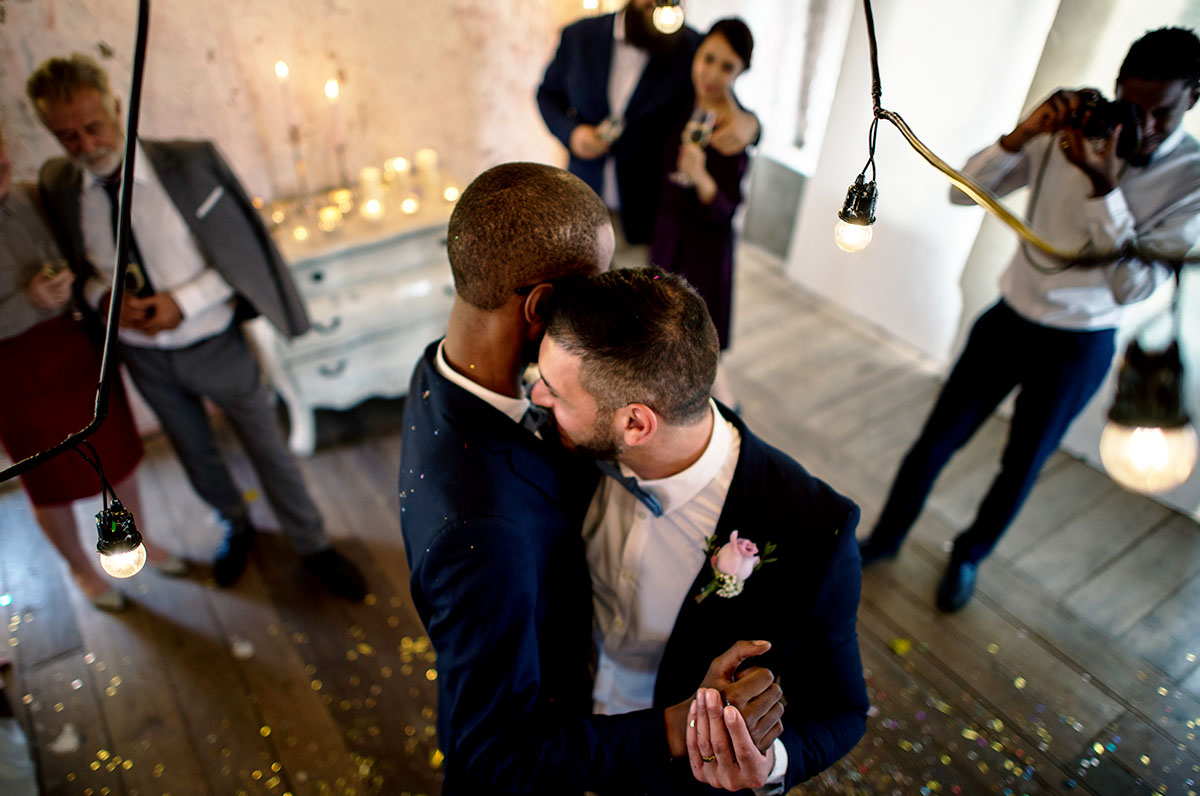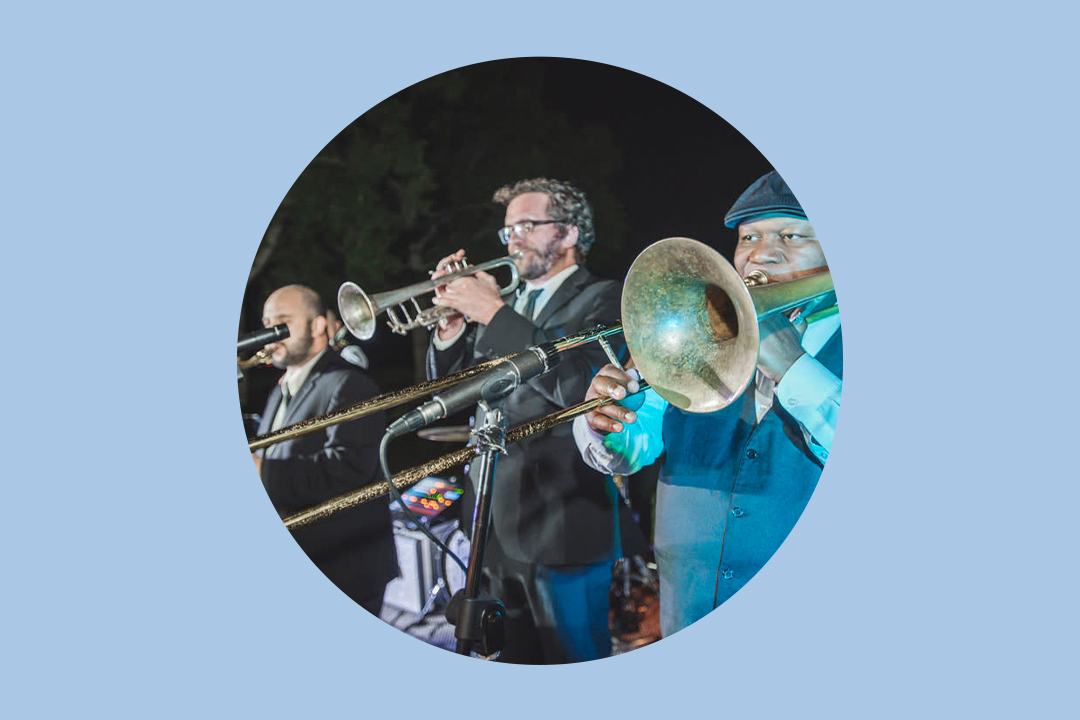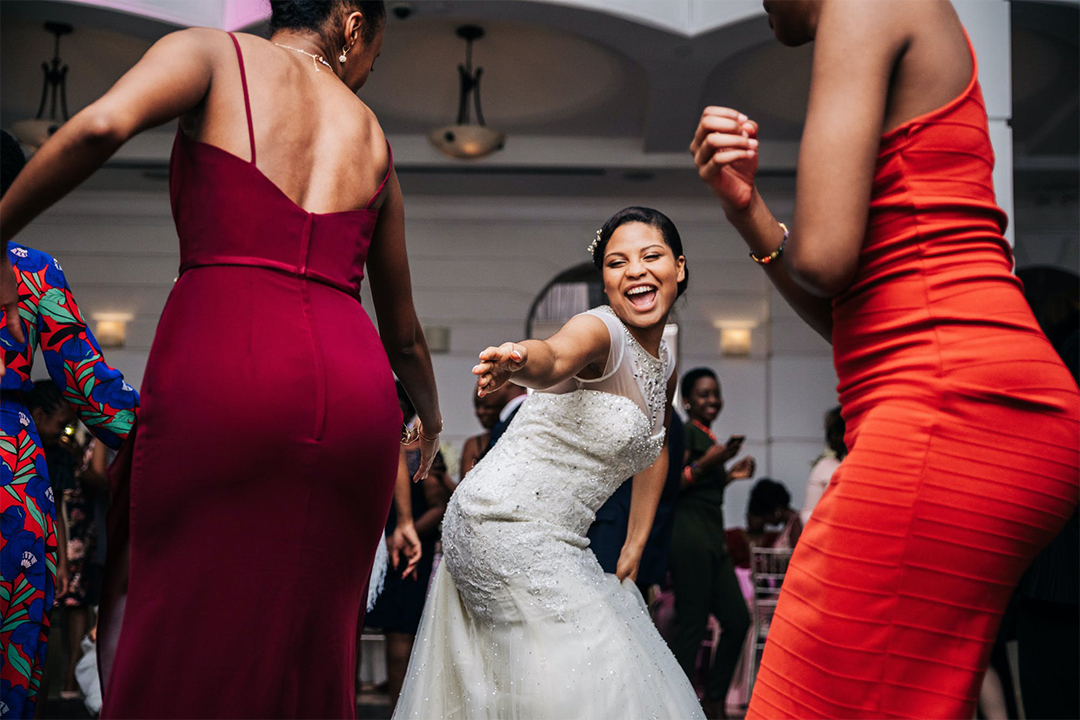- Expert advice/
- Venues & vendors/
- Budgeting/
- Wedding DJ Cost and Budget Guide: Average Prices
- Budgeting
Wedding DJ Cost and Budget Guide: Average Prices
The national average cost for wedding music (including bands and DJs) is $1,567, with most couples spending between $1,300 and $1,900. DJs specifically start around $1,000 for reception-only coverage and can reach $5,000+ for experienced DJs or full-day coverage. Plan entertainment at about 3 percent of your budget.
Last updated November 10, 2025

- Wedding DJs and bands typically cost $1,300-$1,900 nationally, with most couples spending about 3% of their total wedding budget on music and entertainment. Wedding DJs specifically start around $1,000 and can reach upwards of $5,000, though prices vary significantly by location and experience level.
- You're paying for much more than music - professional DJs provide high-quality equipment, MC services, timeline coordination, backup plans, and spend 10-15 hours preparing for each wedding beyond the actual event day.
- Smart savings strategies include booking during off-peak seasons or weekdays, choosing shorter coverage packages, bundling services, or working with experienced DJs who are newer to weddings but offer competitive rates.
- Book 8-12 months in advance and come prepared with specific questions about equipment, music flexibility, coordination services, and backup plans to find the right DJ for your celebration style and budget.
Music sets the mood for your entire wedding celebration, and your DJ plays a huge role in keeping the energy flowing from your first dance to the last song of the night. But figuring out how much to budget for professional DJ services can feel overwhelming when you're juggling all your other wedding expenses.
Understanding what drives DJ pricing helps you make smart decisions about your entertainment budget and find the right professional for your celebration. The cost varies based on your location, the DJ's experience, and what services you need, but knowing what to expect puts you in control of the process.
How Much Does a Wedding DJ Cost?
Wedding music (including bands and DJs) typically cost between $1,300 and $1,900 nationally, with an average price of $1,567, according to The Zola Wedding Cost Index (ZWCI). Most couples allocate about 3% of their total wedding budget to music and entertainment.
DJs typically cost less than a full band, however prices can greatly vary on hours of coverage, experience, equipment needed, and more.
These numbers might feel overwhelming at first glance. Understanding what drives wedding DJ pricing helps you make confident decisions about your entertainment budget. The investment includes much more than someone playing your favorite songs. You're hiring a professional who will keep your celebration flowing smoothly from ceremony to last dance.
Location plays a major role in what you'll pay. Couples in Manhattan, New York typically spend around $2,252 for DJ services. Meanwhile, those in Milwaukee, Wisconsin can expect to pay approximately $1,471 for similar coverage. That's nearly a $800 difference based on geography alone.
Several key factors influence your final cost:
- Experience and reputation: Seasoned professionals command higher rates than newcomers
- Hours of coverage: Full-day service costs more than reception-only packages
- Equipment and setup requirements: Outdoor venues may need additional sound equipment
- Additional services: MC duties, ceremony music, or special lighting features
What You're Actually Paying For
A professional wedding DJ provides comprehensive entertainment services that extend far beyond pressing play on Spotify. You're investing in specialized equipment, extensive music libraries, and the expertise to read a crowd and keep your celebration energetic throughout the night.
The equipment package alone represents significant value. Professional DJs bring high-quality sound systems, wireless microphones, backup equipment, and thousands of licensed songs across all genres and decades. This isn't the same setup you'd use for a backyard barbecue. Wedding-grade audio equipment ensures clear sound coverage for both intimate ceremony moments and packed dance floors.
The time investment extends well beyond your wedding day. Professional DJs typically spend 10-15 hours preparing for each wedding. This includes initial consultations where they learn about your music preferences and wedding timeline. They create custom playlists based on your must-play and do-not-play lists. They coordinate with other vendors like photographers and caterers to ensure smooth transitions between reception events.
Master of ceremonies services represent another crucial component. Your DJ will make announcements, introduce the wedding party, coordinate special moments like the first dance and cake cutting, and guide the flow of your reception. Think of them as your reception's director, keeping everything on schedule while maintaining the energy you want.
Professional DJs also carry liability insurance to protect you and your venue. They maintain business licenses and professional memberships that ensure they're operating legally and ethically. Many belong to organizations like the American DJ Association, which requires continuing education and adherence to professional standards.
The pricing also typically covers travel time to your venue, equipment setup and breakdown, and often includes a backup plan if the primary DJ becomes unavailable. This comprehensive service model explains why wedding DJs command higher rates than DJs who simply play music at clubs or corporate events.
What Makes Wedding DJ Prices Different?
Several factors influence how much you'll pay for wedding DJ services. Understanding these variables helps you evaluate quotes and find the right fit for your celebration and budget.
Experience level
Entry-level wedding DJs typically charge toward the lower end of the standard range while they build their portfolios and gain experience. These DJs may be newer to the wedding industry but often bring fresh enthusiasm and competitive pricing. They're still learning to read crowds and handle the unique challenges that come with wedding receptions.
Mid-level professionals with 3-5 years of wedding experience usually fall within the average pricing range. They offer a good balance of expertise and value. They've handled enough weddings to understand common challenges and have developed systems for keeping receptions flowing smoothly.
Seasoned wedding DJs with extensive experience and strong reputations command premium rates at the higher end of the range or beyond. They have refined their crowd-reading skills over hundreds of weddings. They've built relationships with venues and vendors that help coordinate your day. They've also developed backup plans for handling unexpected situations that can arise during celebrations.
Reputation and referrals also affect pricing. DJs with strong reviews and word-of-mouth recommendations can charge more because couples trust their ability to deliver exceptional service. Those featured in wedding publications or with awards from industry organizations often price at premium levels.
Hours of coverage
Most wedding DJ packages are based on a specific number of hours, typically ranging from 4-8 hours of coverage. The length of service directly impacts your total cost. Reception-only packages focus on dinner and dancing, typically covering 4-5 hours. These cost less than full-day packages but require you to handle ceremony music separately.
Full-day coverage includes ceremony music, cocktail hour, and reception entertainment. These packages typically run 6-8 hours and provide seamless service throughout your celebration. Some DJs offer extended packages for couples planning longer celebrations or after-parties.
Ceremony and cocktail hour coverage may be included in the base package or offered as add-ons. Adding ceremony coverage usually increases the total cost by $200-500, depending on equipment requirements and setup complexity. Cocktail hour coverage might add another $100-300.
Overtime charges apply if your celebration runs longer than contracted. These typically range from $100-200 per additional hour. It's important to accurately estimate your timeline and build in a buffer to avoid surprise costs.
Where you're getting married
Geographic location significantly impacts DJ pricing. Metropolitan areas typically command higher rates than rural locations due to higher operating costs and increased demand. Urban DJs often have higher expenses for business licenses, insurance, and equipment storage.
Venue type also affects cost. Indoor venues with existing sound systems may require less equipment setup. Outdoor weddings often need additional equipment for proper sound coverage across larger spaces. Some outdoor locations require generators for power, which can increase costs.
Venue accessibility influences pricing too. DJs may charge more for venues with difficult load-in requirements, such as multiple flights of stairs or long distances from parking to setup areas. Beach or mountaintop locations that require special equipment transport often incur additional fees.
Travel fees may apply if your chosen DJ is located far from your venue. These fees typically cover transportation costs and travel time. DJs usually charge travel fees for venues more than 30-50 miles from their home base. The fees can range from $50 for nearby locations to several hundred dollars for distant venues.
Some venues have noise restrictions or specific equipment requirements that can influence pricing. DJs may need special permits for certain locations or specific types of equipment to meet sound limit requirements.
Smart Ways to Save Without Sacrificing Quality
Every couple wants exceptional entertainment without overspending their budget. Strategic choices can help you secure professional DJ services while staying within your financial comfort zone.
Timing your wedding strategically offers immediate savings opportunities. Book during off-peak wedding seasons like January through March, or November for potential discounts. Many DJs offer reduced rates for weekday weddings or Sunday celebrations. Friday weddings often cost less than Saturday celebrations while still feeling special to guests.
Early booking, typically 8-12 months in advance, can lock in current pricing before annual rate increases. Many DJs raise their rates each year, so booking early protects you from price bumps. Some offer early-bird discounts for couples who book well in advance.
Consider shorter coverage packages if your celebration doesn't require full-day service:
- Reception-only packages: Cost less than full-day coverage and work well if you have simple ceremony music needs
- Reduced hour packages: Some DJs offer 4-5 hour packages instead of standard 6-8 hour coverage
- Ceremony add-ons: Instead of full-day service, add ceremony coverage to a reception package for lower total cost
Bundle services with DJs who offer additional entertainment options. Some DJs provide photo booths, uplighting, or ceremony musicians as package deals. These bundled services often provide better value than hiring multiple separate vendors. However, make sure you actually want the additional services rather than paying for extras you won't use.
Research DJs who are building their wedding portfolios but have experience in other event types. These professionals may offer competitive rates while providing quality service. Look for DJs transitioning from club or corporate event work to weddings. They often have strong technical skills and music knowledge but price competitively while building wedding-specific experience.
Ask about stripped-down packages that focus on core DJ services without premium add-ons:
- Basic sound systems: Instead of premium equipment packages
- Standard lighting: Skip special effects lighting or uplighting
- Single setup location: Avoid multiple equipment moves between ceremony and reception
Skip unnecessary extras that don't align with your celebration style. Features like fog machines, laser lights, or elaborate sound systems for small intimate weddings may not be worth the additional investment. Focus your budget on the services that will have the biggest impact on your guest experience.
Negotiate package flexibility rather than asking for blanket discounts. Many DJs prefer to adjust services rather than reduce their rates. Ask about customizing packages to fit your budget by removing services you don't need rather than requesting lower prices for full packages.
When to Book (And What To Ask)
Popular wedding DJs book up quickly, especially during peak wedding season from May through October. Secure your DJ as soon as your venue is confirmed, ideally 8-12 months before your wedding date. This timeline gives you access to the best selection of available professionals and allows adequate time for planning and coordination.
Last-minute bookings often mean settling for whoever is available rather than choosing the best fit for your celebration. DJs with strong reputations and competitive pricing typically book first, leaving fewer quality options for couples who wait.
Come prepared with specific questions to ask wedding DJs that help you evaluate each DJ's fit for your celebration. These questions reveal important details about their service and professionalism:
Service and equipment questions
- What's included in your base package price?
- Do you have backup equipment and a contingency plan if you're unable to perform?
- How many weddings do you typically DJ per weekend during peak season?
- What type of sound system do you use and is it appropriate for our venue size?
Music and style questions
- Can we provide a do-not-play list along with our must-play songs?
- How do you handle guest requests during the reception?
- What's your process for creating our custom playlist?
- Can you accommodate special cultural music requirements?
Coordination and logistics questions
- What's your process for coordinating with other vendors like photographers and caterers?
- How do you handle timeline changes on the wedding day?
- What's your setup and breakdown timeline?
- Are there any additional fees for setup, travel, or overtime?
Business and reliability questions
- Can you provide references from recent weddings similar to ours?
- Do you carry liability insurance and what does it cover?
- What's your cancellation and refund policy?
- Do you have contracts that clearly outline services and pricing?
Watch for red flags during your search. DJs who won't provide references may be hiding poor performance or lack of experience. Those who seem inflexible about music preferences might not adapt well to your crowd or celebration style. Professionals who can't clearly explain what's included in their pricing may surprise you with additional costs later.
Request to hear samples of their work or attend an eventwhere they're performing if possible. This gives you a firsthand sense of their style, energy level, and ability to read and engage a crowd throughout the evening. Pay attention to how smoothly they handle transitions between activities and their interaction style with guests.
Professional wedding DJs should be responsive, organized, and enthusiastic about your vision. They should ask thoughtful questions about your music preferences, guest demographics, and celebration style. They should provide clear contracts and be upfront about all costs and policies.
Plan Your Wedding Music Together
Finding the right wedding DJ is a crucial step in creating your perfect celebration. The professional you choose will help set the tone for your entire reception and ensure your guests have an unforgettable time on the dance floor.
Understanding DJ costs helps you budget appropriately and evaluate your options with confidence. Remember that the cheapest option isn't always the best value, and the most expensive doesn't guarantee the perfect fit. Focus on choosing your wedding DJ whose style, experience level, and service approach match your vision and budget.
Ready to find your perfect wedding DJ? Explore highly-rated DJs and music professionals in your area and read reviews from real couples to make the best choice for your celebration.
Quick Answers to Common Questions
Should I book a DJ or live band for my wedding reception?
DJs offer more music variety and typically cost less than live bands. Bands provide unique energy but have higher costs and need more space for equipment and performers.
Can I provide my own music playlist instead of hiring a DJ?
While possible, DIY music lacks professional sound equipment, MC services, and the ability to read and adjust to your crowd throughout the celebration.
What happens if my DJ gets sick on my wedding day?
Professional DJs carry contracts and insurance, and reputable companies maintain backup DJ networks. Always confirm their contingency policy before booking.
How far in advance should I book my wedding DJ?
Book your DJ 8-12 months before your wedding date. Popular professionals book up quickly during peak season, especially for Saturday weddings.
Do wedding DJs take song requests from guests?
Most DJs welcome guest requests but will run them by you first if they're not on your approved list. Discuss your preference for handling requests during your initial consultation.
Up next for you

50 Questions to Ask Wedding DJs and Bands Before Booking
Music + Entertainment
Your DJ plays a crucial role in the standout moments of your wedding. This list of questions to ask wedding DJs will help guide your decision to book with them.

Average Cost of Weddings in 2026: (A Real Numbers Guide)
Advice
Average cost of weddings in 2026: See national averages for venues at $8,573 and catering at $6,927, plus key vendor costs to plan your budget.

How to Choose Between a Wedding Band or DJ
Advice
Your reception entertainment sets the tone for much for your wedding, so it's paramount that your vendor is a great fit. Weigh the pros and cons of wedding bands and wedding DJs to help you choose between the two.

Wedding Live Band Cost: Planning Your Music Budget
Advice
The national average cost for wedding music (including bands and DJs) is $1,567, with most couples spending between $1,300 and $1,900. Live wedding bands specifically start around $2,500 for small acoustic groups and can reach $10,000+ for full show bands. Allocate about 5-8% of your budget to live music.
- Expert advice/
- Venues & vendors/
- Budgeting/
- Wedding DJ Cost and Budget Guide: Average Prices
Find even more wedding ideas, inspo, tips, and tricks
We’ve got wedding planning advice on everything from save the dates to wedding cakes.
